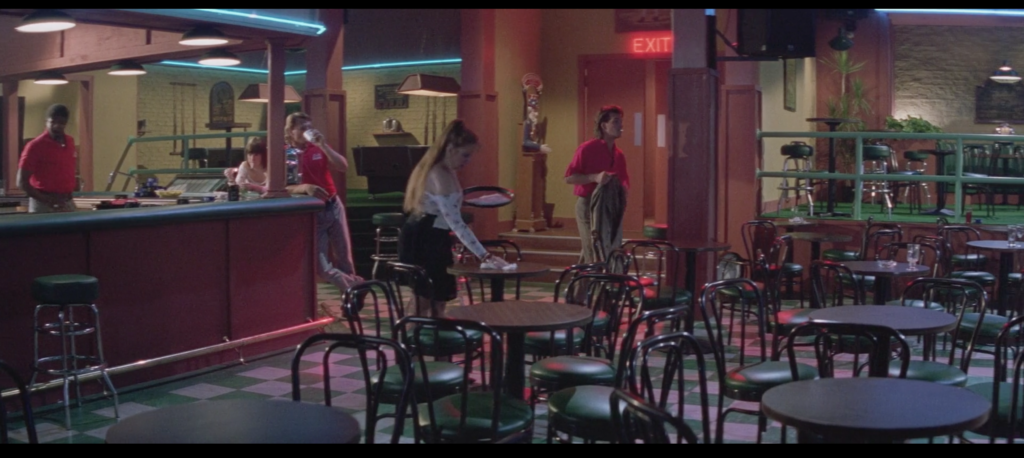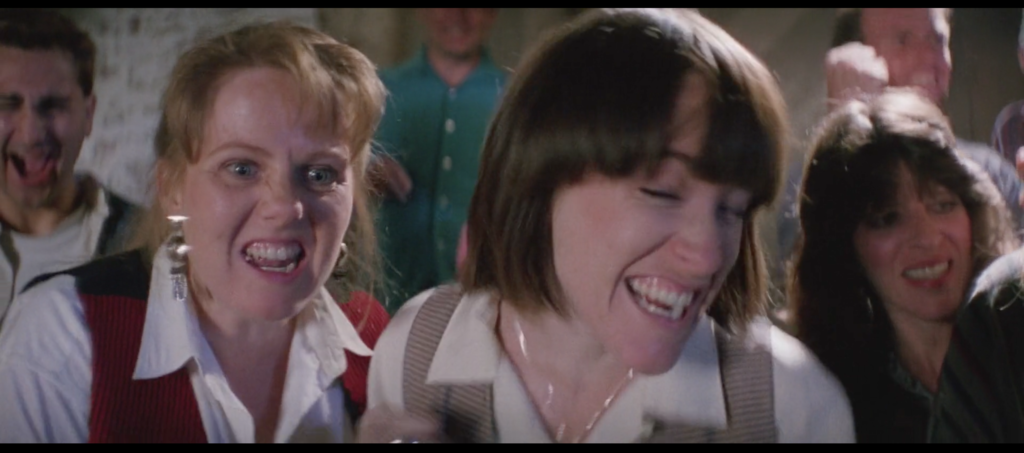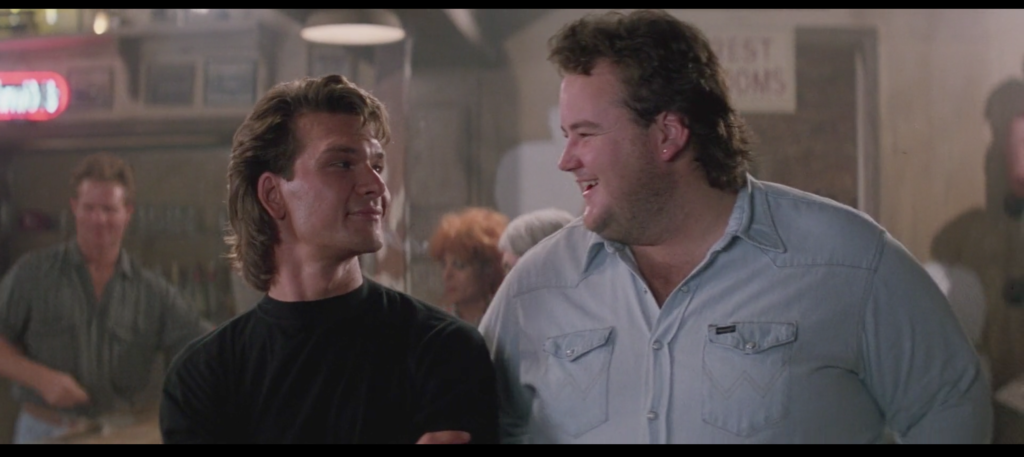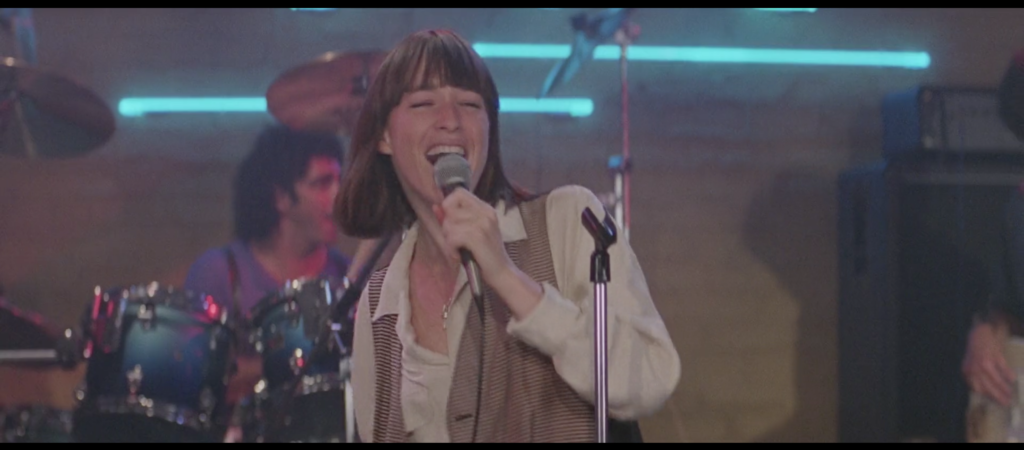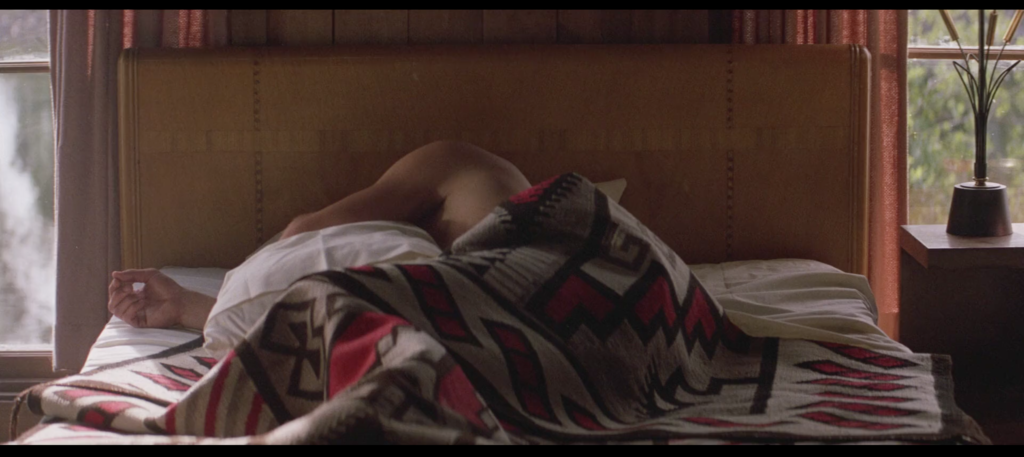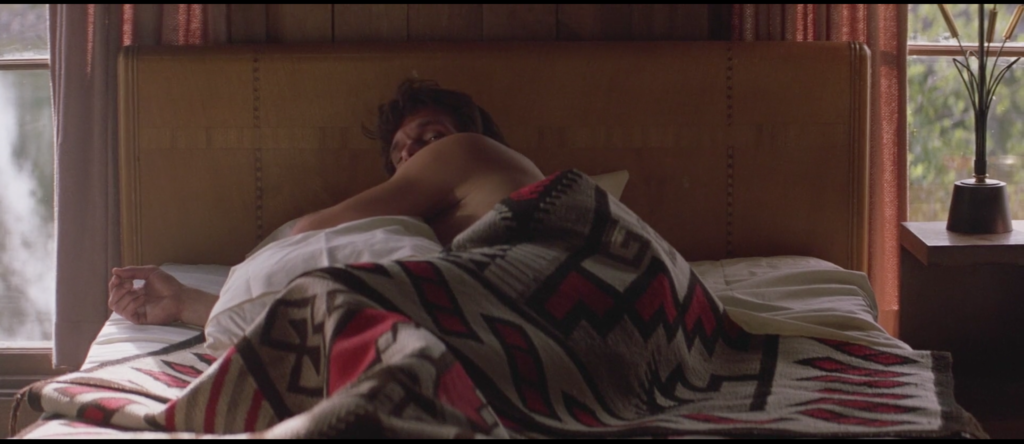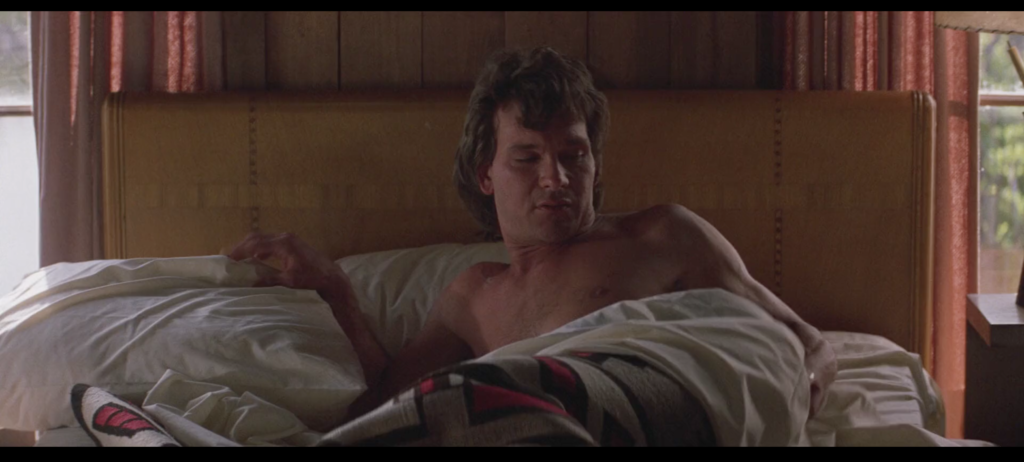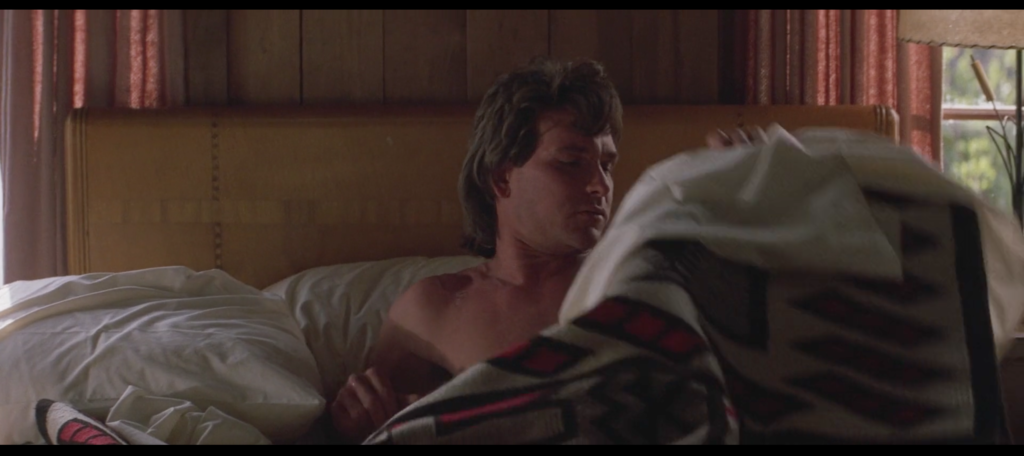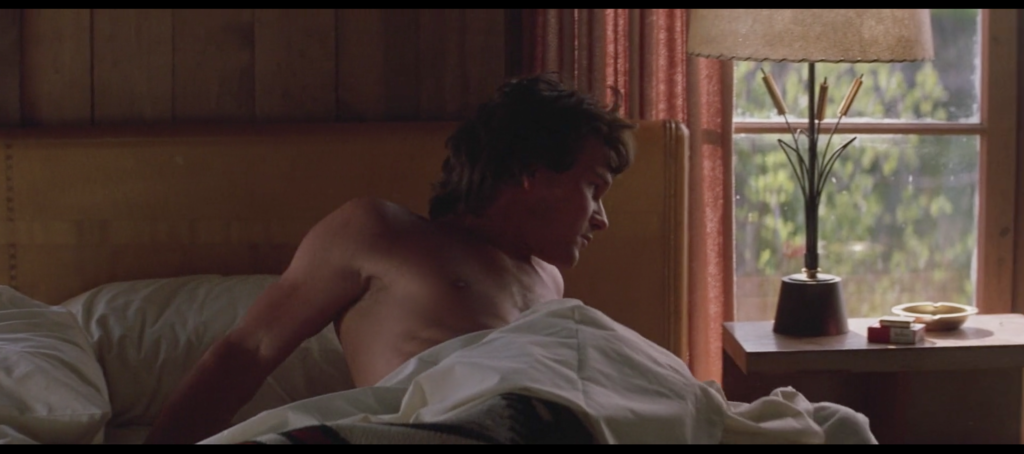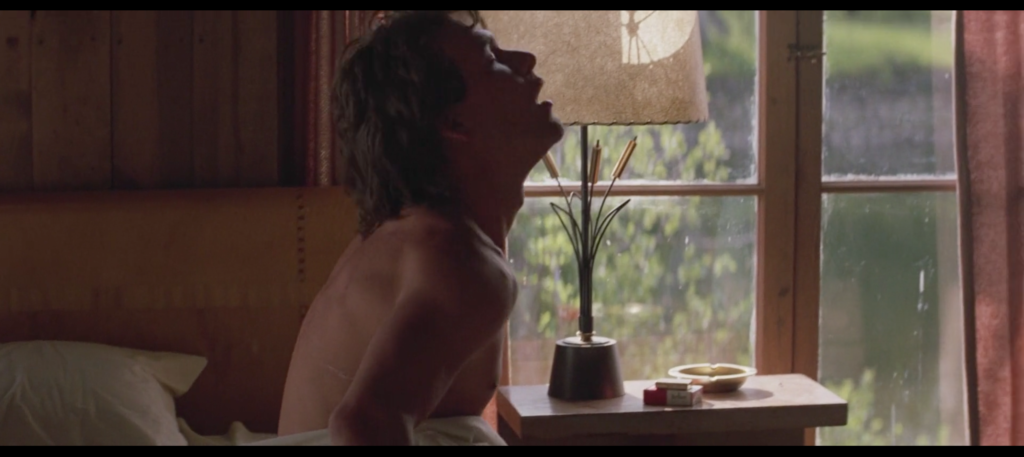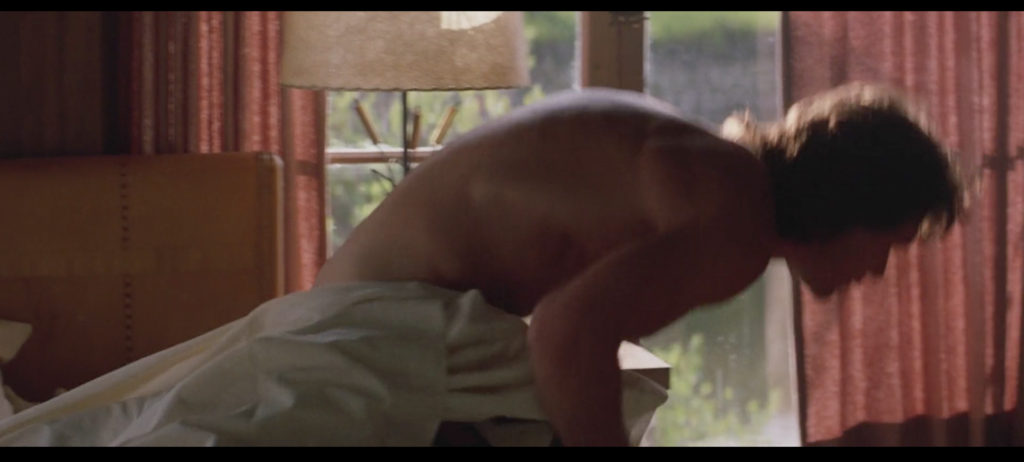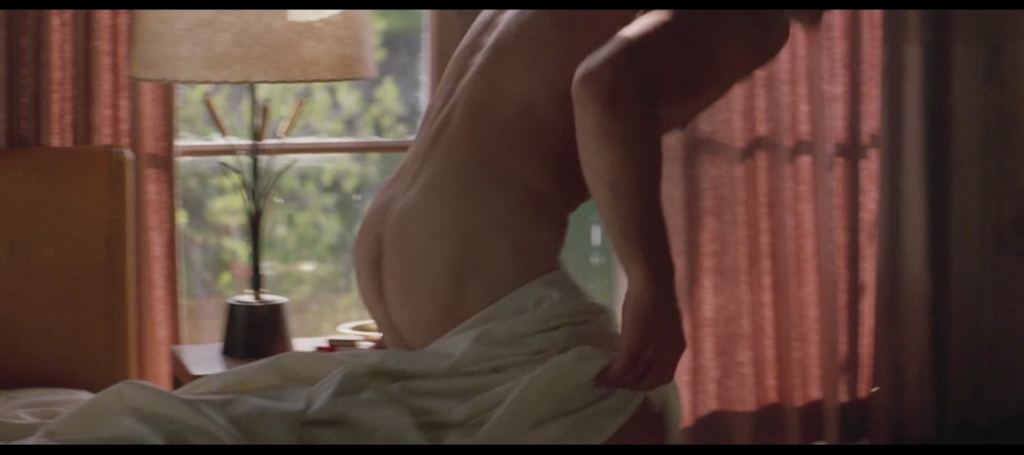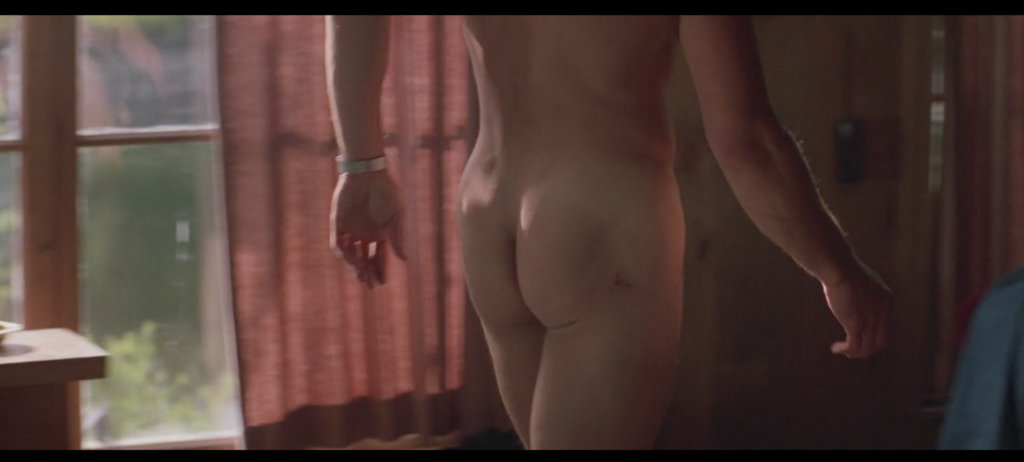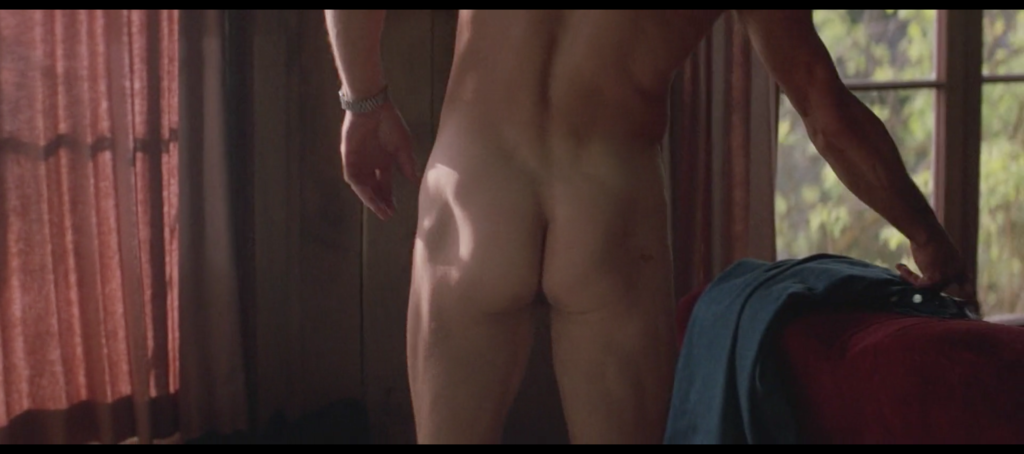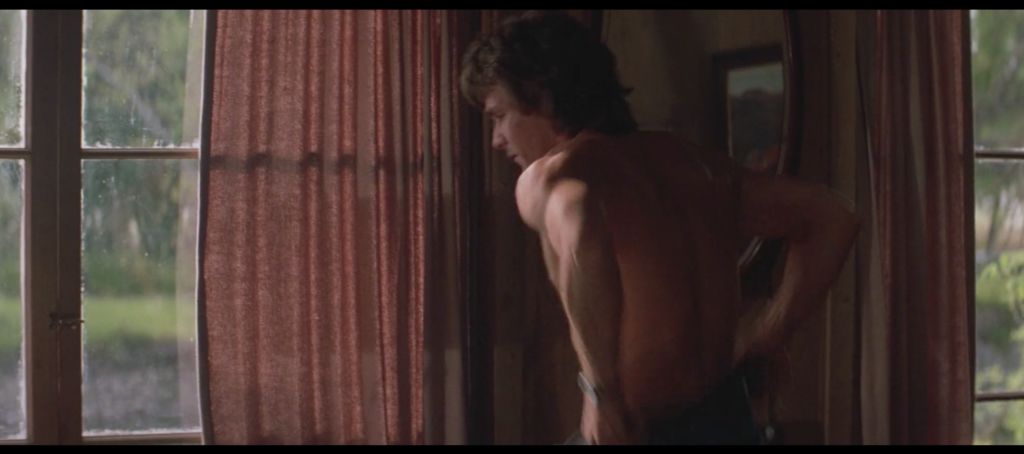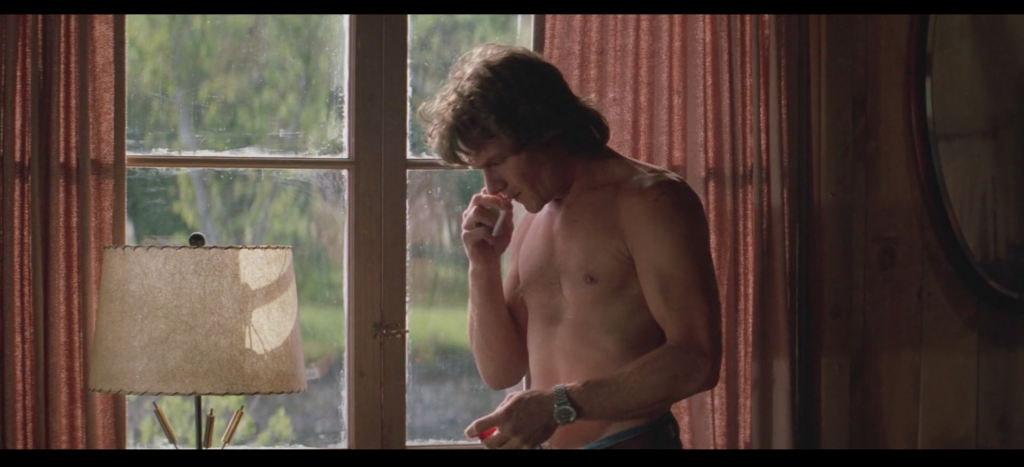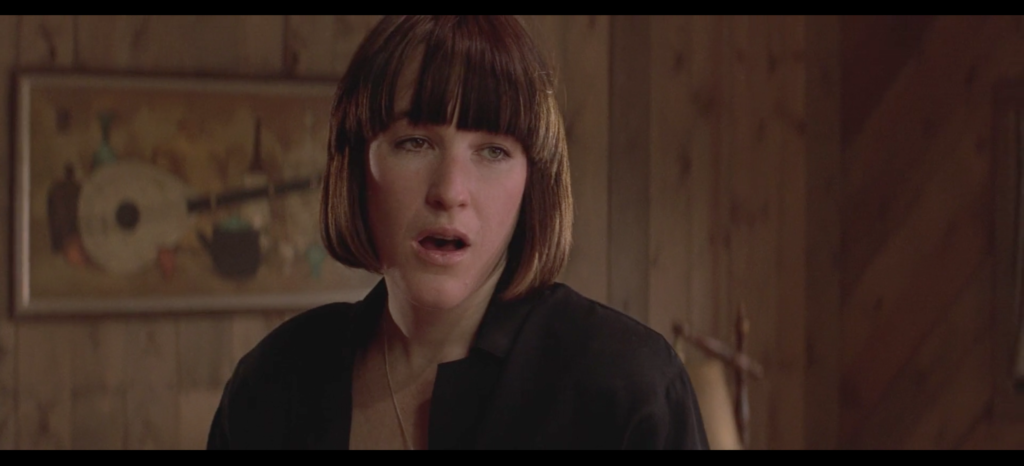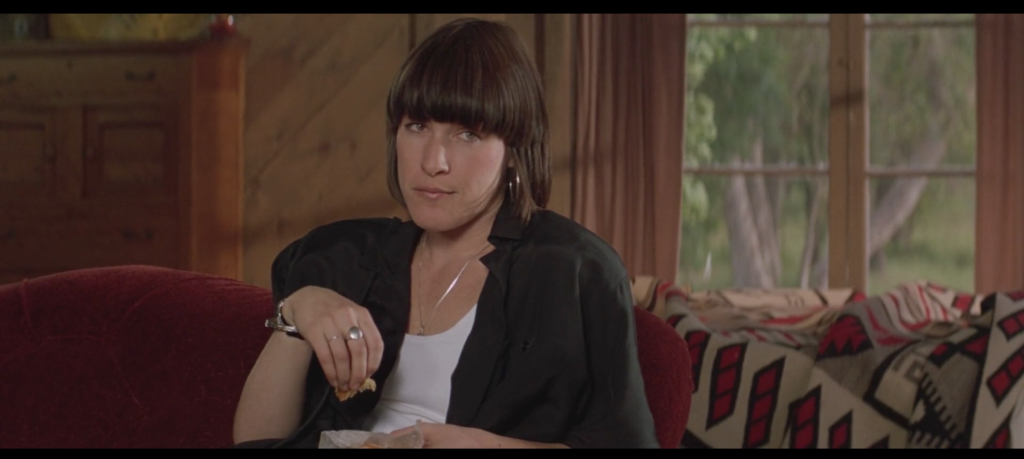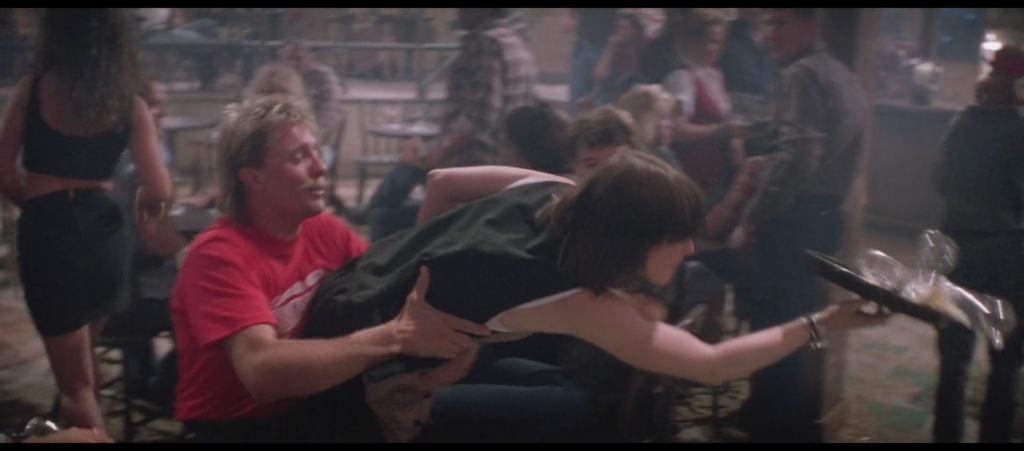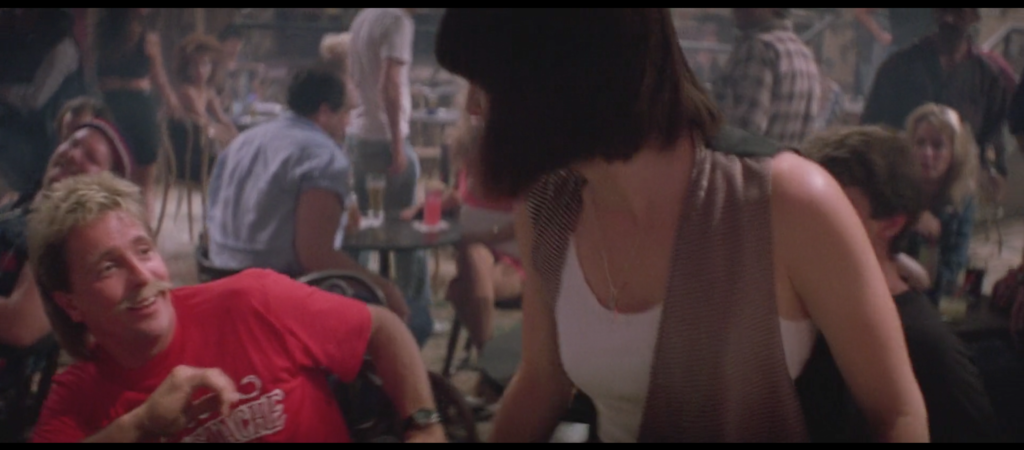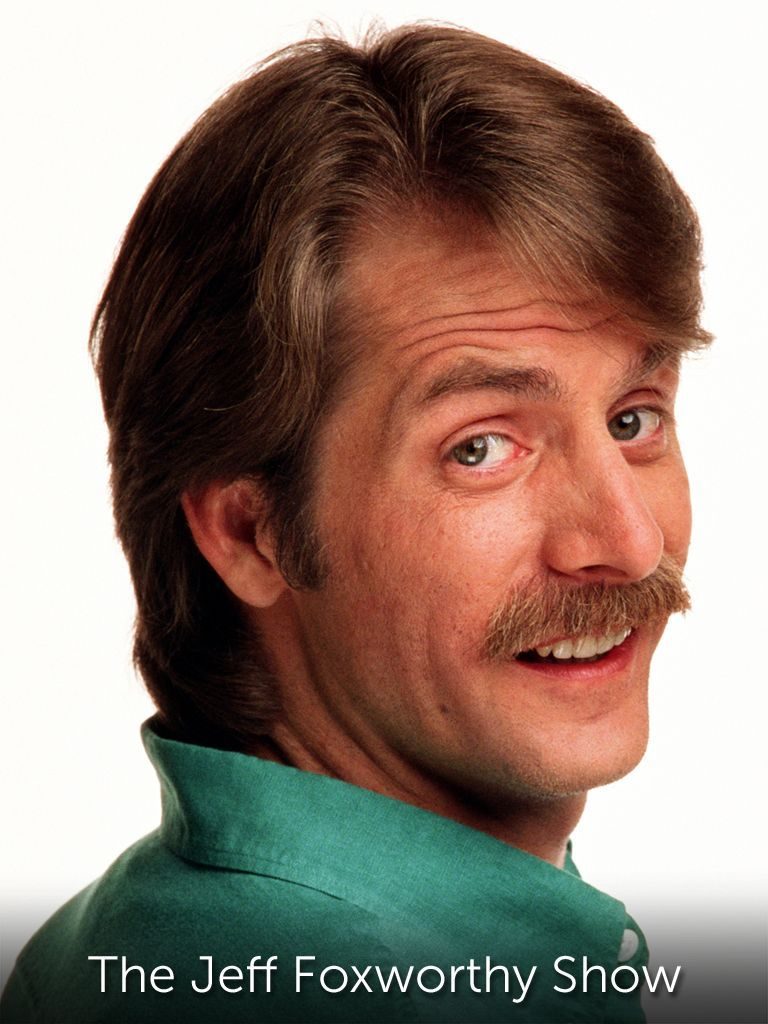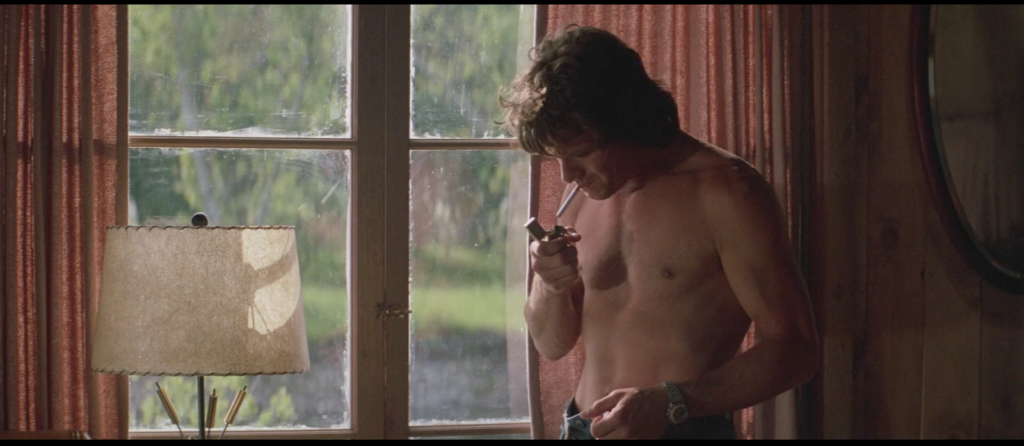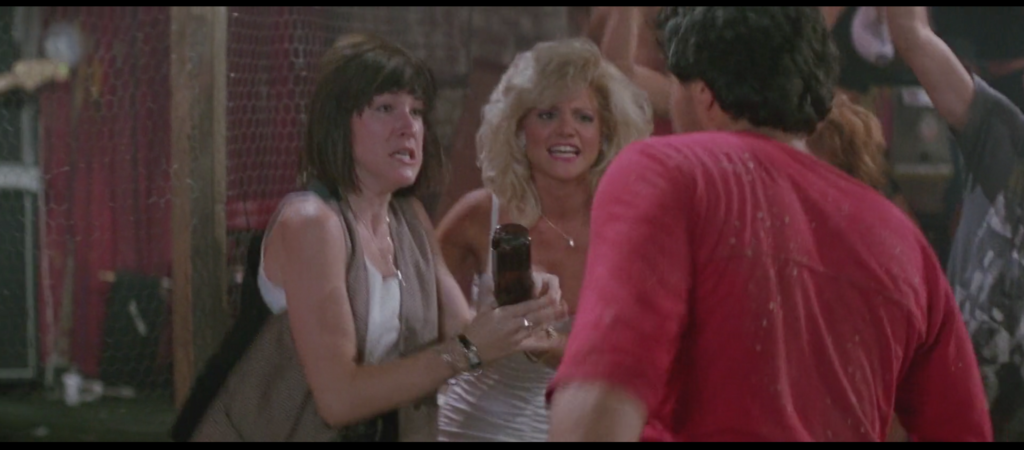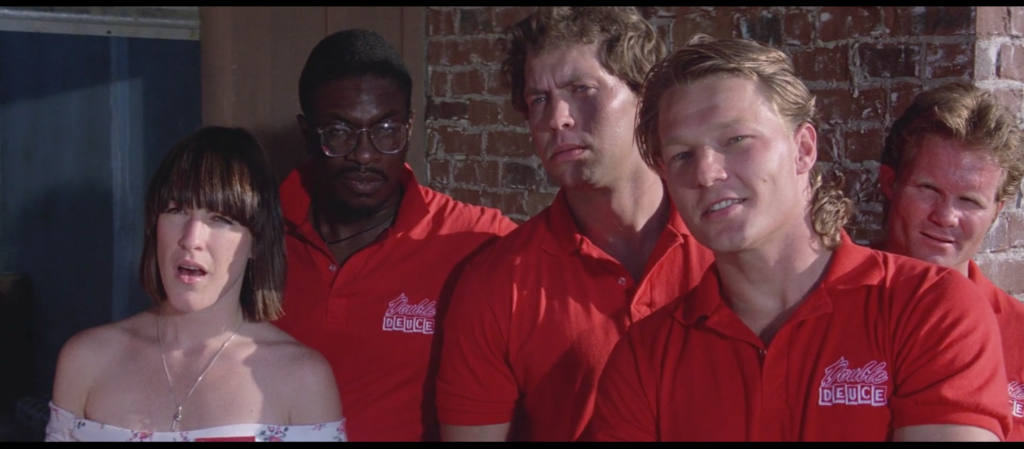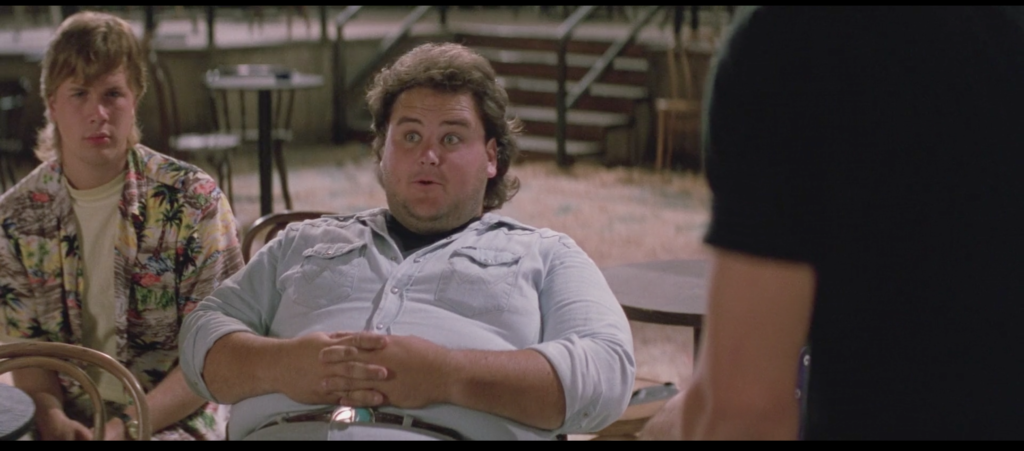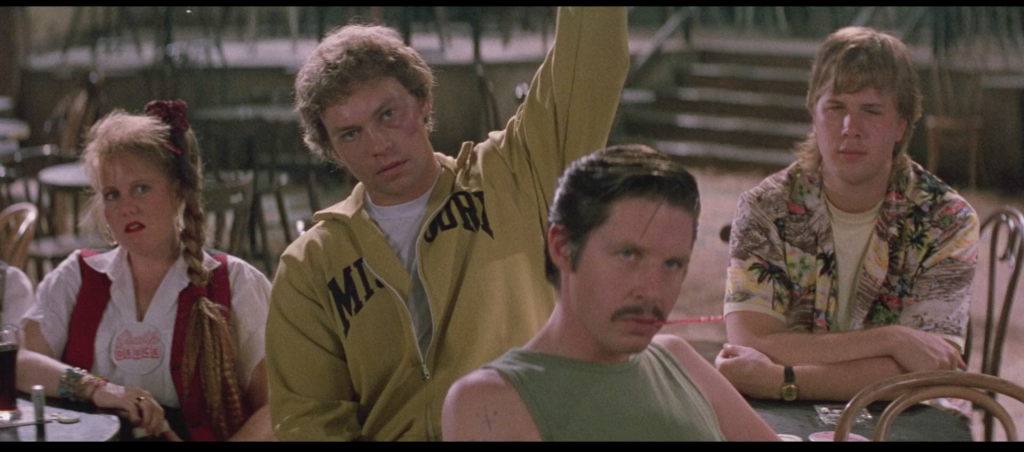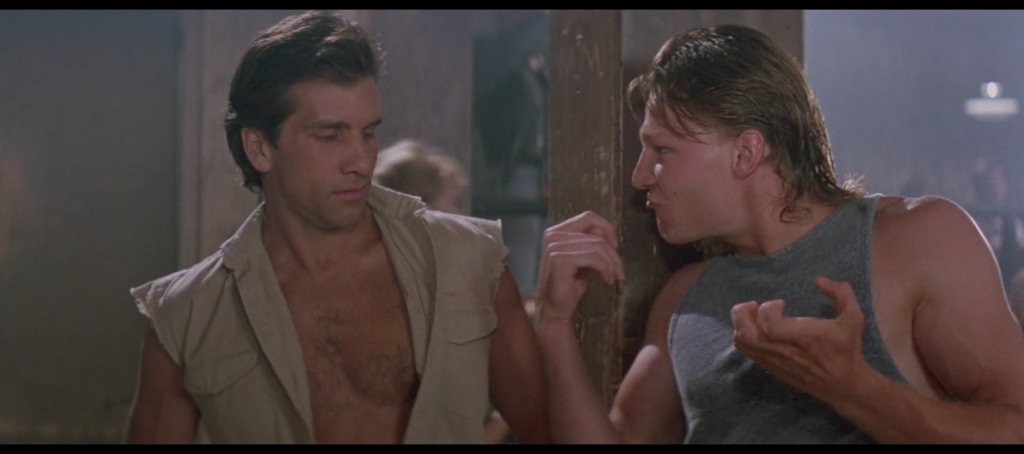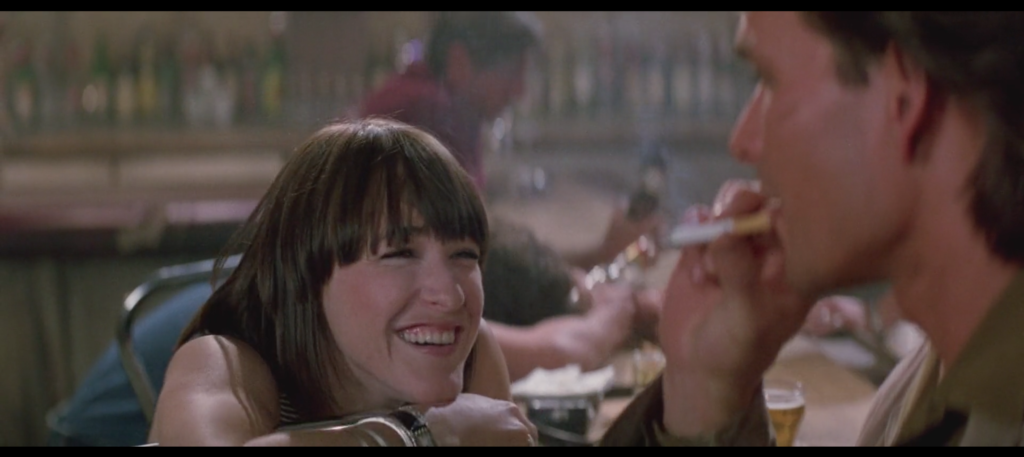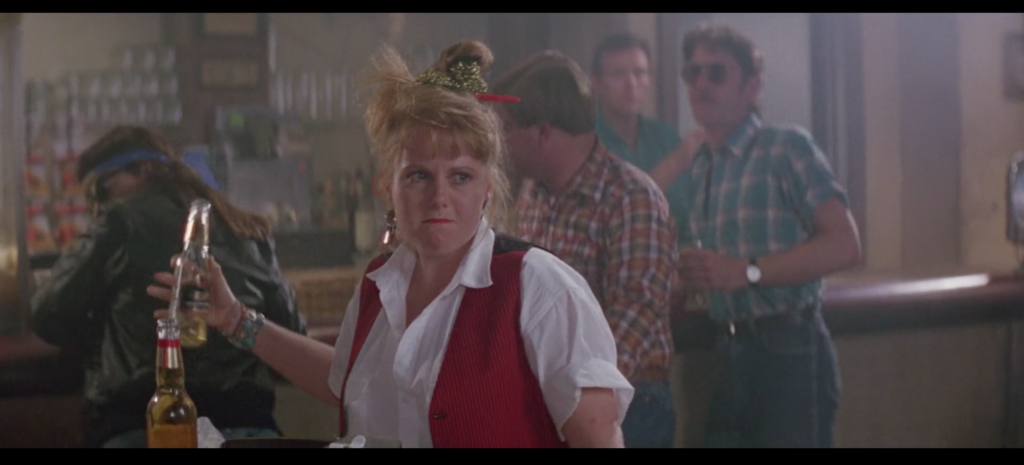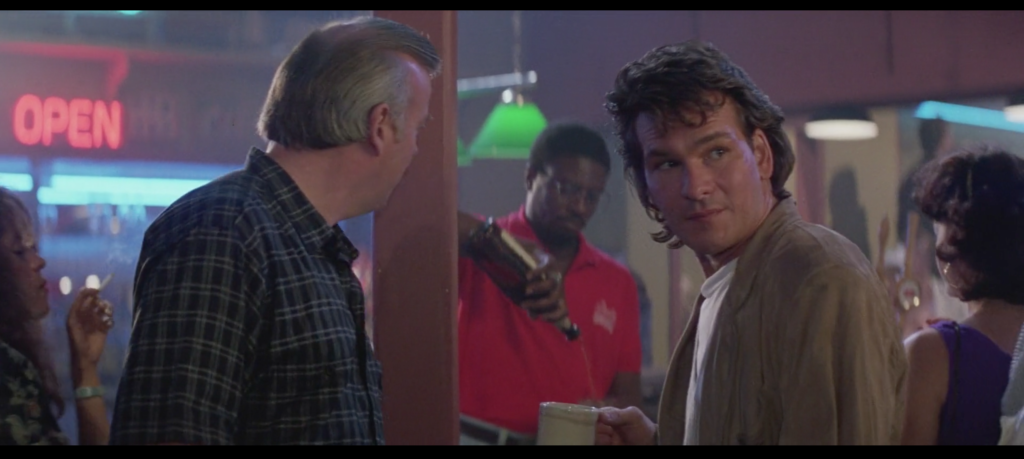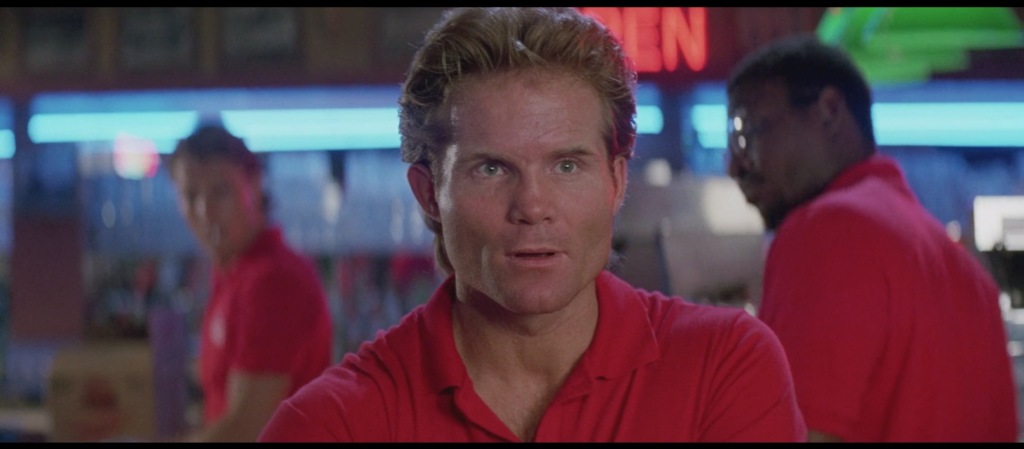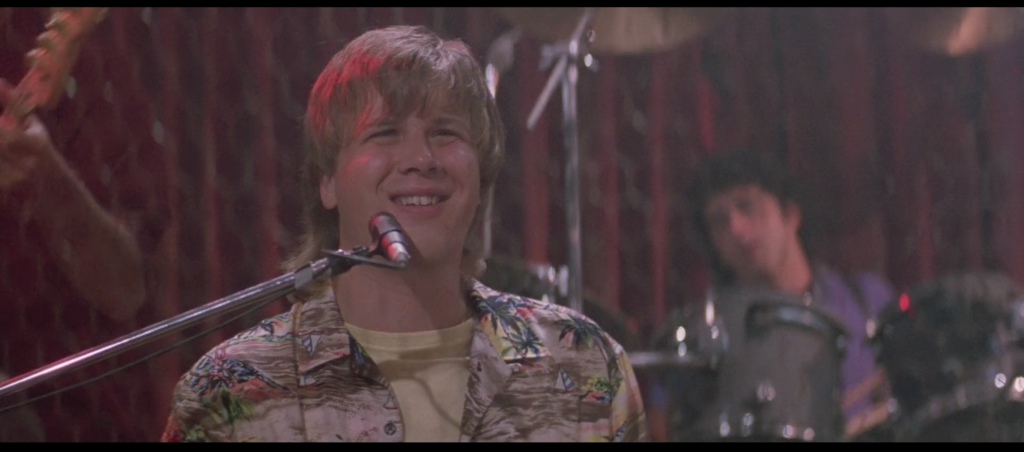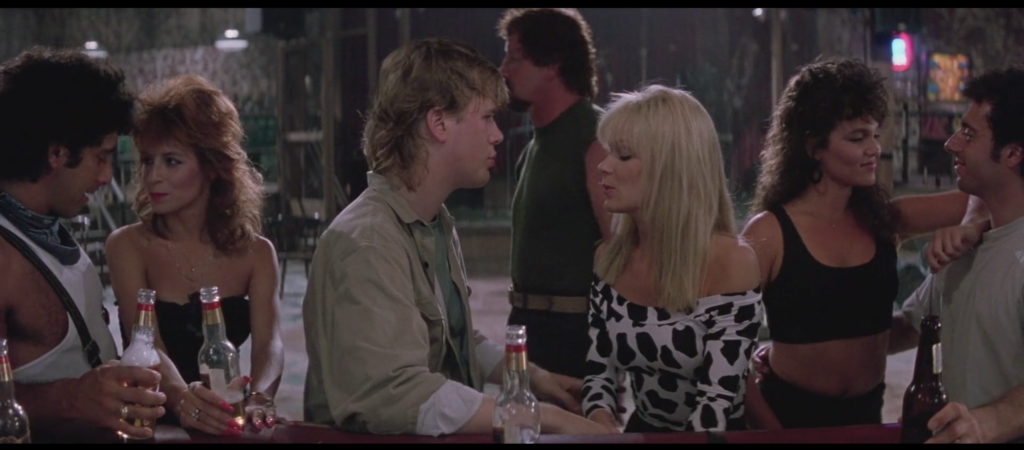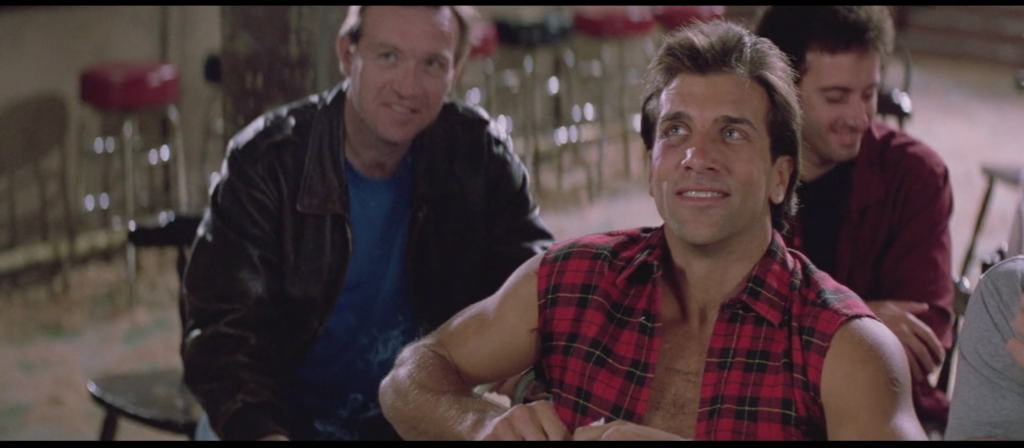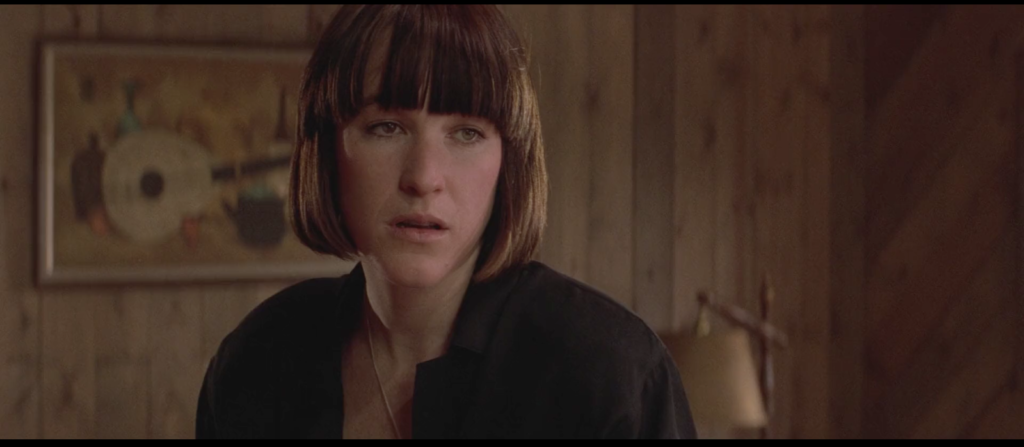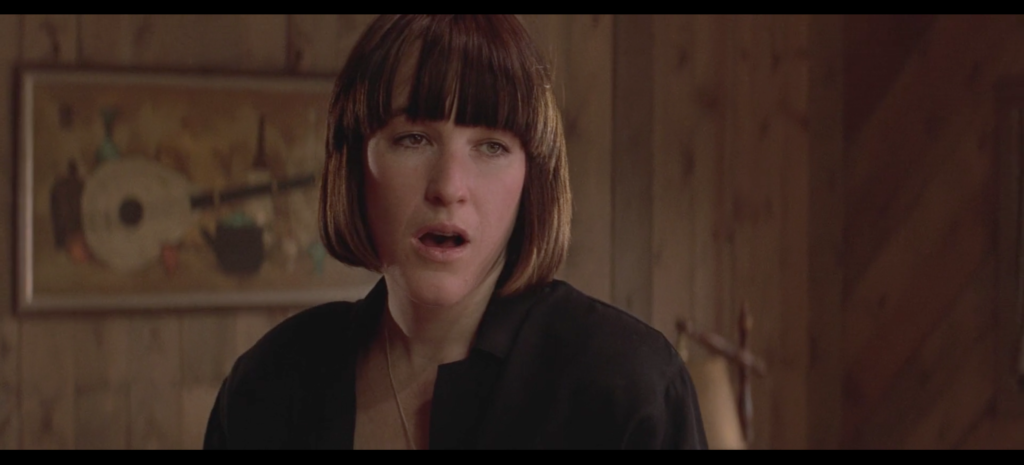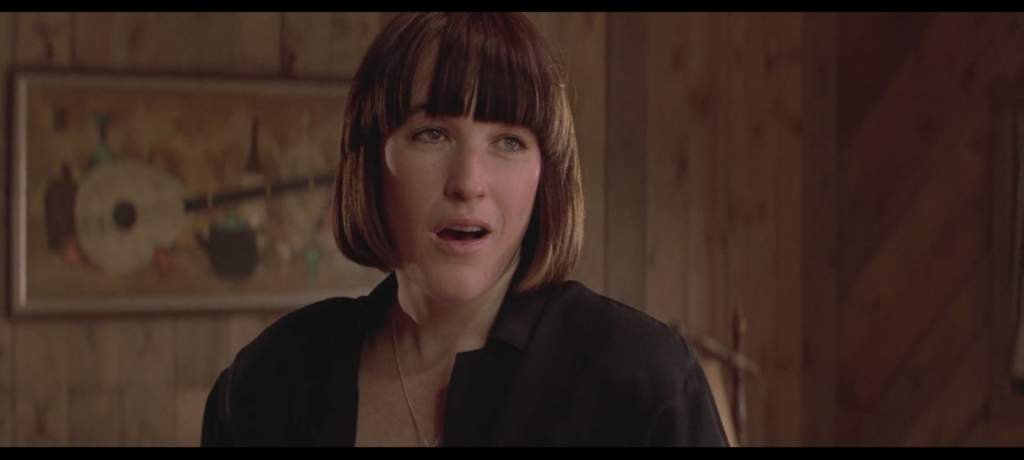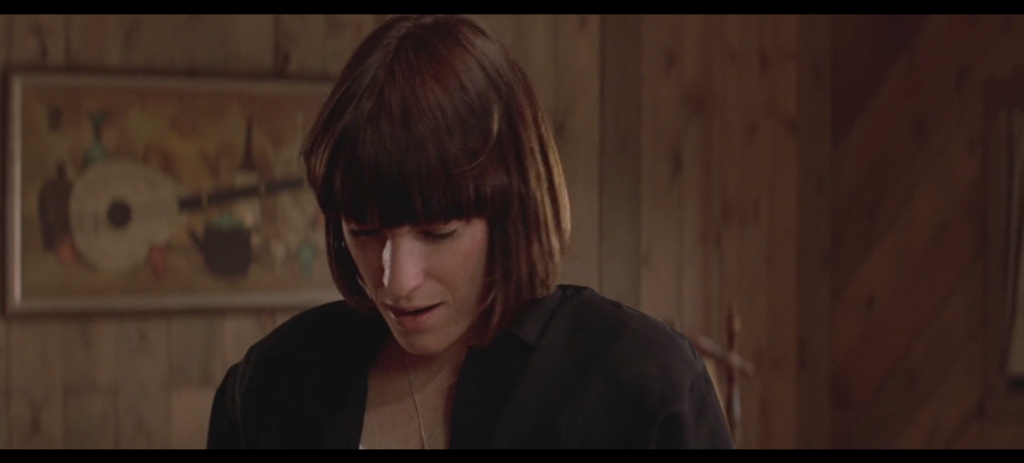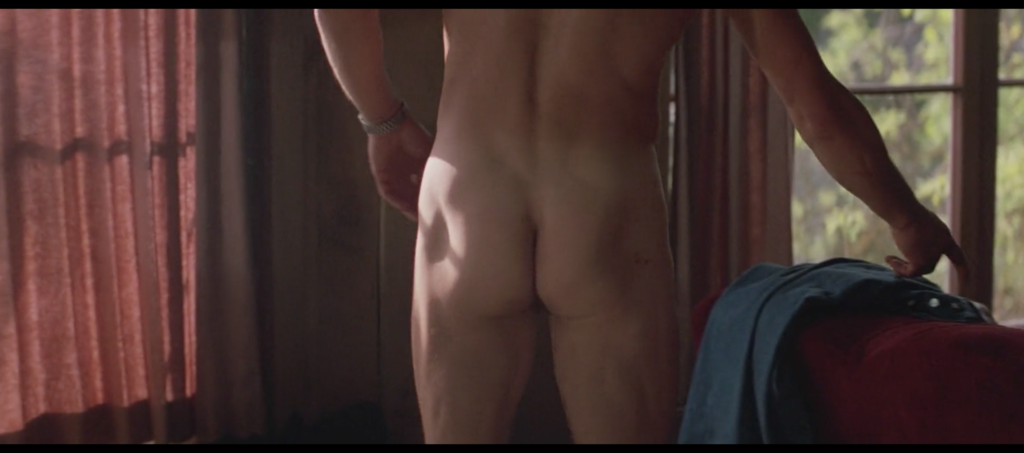Posts Tagged ‘carrie ann’
215. Tableau V
August 3, 2019Ernie straightening up behind the bar. Carrie Ann lighting a cigarette. Hank sipping his coffee. Whatsername the German schoolgirl–looking waitress wiping down a table. And Dalton, smoke in his mouth, fresh from a day working out and helping Emmett and a night of love with Dr. Elizabeth Clay, doffing his jacket as he arrives for a night’s work, greeted with a “Hey, doll!” and a “There he is!” from his admiring underlings. This is the Double Deuce as it was always meant to be: safe, familial, professional, with a lot of matching reds.
But it is not yet the Double Deuce at its absolute finest. That will require the arrival of another cooler, older, slyer, more powerful, subtle and not quick to anger. It will require us, at long last, to walk the Way of Wade Garrett. Between now and then Dalton will receive very bad news and a very bad beating. It is as if the universe itself cries out, “Not yet, Dalton. Not yet.”
134. Nobody ever wins a fight?
May 14, 2019Here are Stella and Carrie Ann, the waitstaff at the Double Deuce, watching Dalton, Jack, Hank, and Younger, the bouncers at the Double Deuce, whip the shit out of Ketchum and his pals, would-be assassins at the Double Deuce. They leer and cheer from the sidelines like extras shown in slo-mo during a Rocky movie when someone’s getting absolutely beaten senseless, only they’re not in slo-mo, they’re in glorious real time. Representative dialogue: “GO ON GO KICK HIS AAASSSSSS!” When the dust settles and the last man goes down you can hear Carrie Ann’s distinctive white-soul rasp: “ALLLRIGHT! YEAH!” She sounds as satisfied as Matthew McConaughey lighting a spliff after having sex for two hours.
And why shouldn’t she? Carrie Ann, we’ve seen, was the victim of sexual harassment we can safely assume was constant until Dalton showed up and announced “It’s going to change.” Stella was almost certainly in the same boat. For untold years, these two women had to take drink orders from men who would convert those drinks into that many more ass-pinches and face-punches. We’ve watched both women resort to using beer bottles as weapons to try and stem the tide of violence in their own favor.
The Double Deuce was an absolute hellhole, a Missouri Mos Eisley Cantina, the Inn at the Crossroads during Lannister rule, Rick’s if Bogey was playing his character from In a Lonely Place and Peter Lorre was the child killer from M and Claude Rains was the Invisible Man. It was a hideous, soul-destroying place to work. It’s a miracle these women made it out emotionally intact.
But it ain’t like that anymore, and I can’t imagine Carrie Ann and Stella are nuts about anyone who’d like to restore that particular status quo ante. They recognize Ketchum and his church potluck pals for what they are. You see in their faces and hear in their voices the hunger of people who are finally getting to see their oppressors get theirs. I’d like to see these faces and hear these voices much, much more often.
125. “I didn’t know she could sing!”
May 5, 2019If this configuration of Dalton and his padawan-learner Jack looks familiar, it’s because we’ve been here before. The exchange and fight scene that are about to occur are perhaps the purest distillation of the Dalton Path in the entire film, following the Three Simple Rules and their various chapters and verses to the letter. As a bonus they show the primacy and utility of Jack among the Double Deuce’s other bouncers. It is Jack, after all, to whom Dalton relays the Riddle of the Right Boot, counting on the younger man to solve it. When they move on the intruders who’ve come to the bar to murder a man by kicking him in the head with a boot-mounted knife on account of the fact that he fired a rich guy’s nephew, they move as one.
But how did they arrive at this point? By what strange magic were Dalton and Jack united at this moment? The magic…of rock.
Specifically Carrie Ann’s variant thereof. The big-grinned barmaid with the bangs has traditionally occupied a privileged position in Dalton’s orbit. It is she to whom he first entrusts the secret of his name. It is she who preaches his name to the other barfolk. It is she who is granted a glimpse of the ass.
Now that the Double Deuce has been cleaned up, it is she who takes the stage to demonstrate this fact to the viewer. Would any woman have been caught dead on the stage of the old Double Deuce, where the only thing separating you from the ravening hordes, whose attention is drawn to and focused on that stage in a way no other staffer or patron can claim, was a thin chickenwire line? To be honest, dead might be the only way a woman would get caught on that thing. Putting a blind guy up there strikes me as some kind of ADA violation as it is.
But now things are different. How different? Different enough that a server is up there singing her gorgeous, joyful heart out. (Kathleen Wilhoite is truly one of this movie’s MVPs; I have no doubt from the way she shakes and grooves and grins and at one point even puts her hand to her face like “holy shit I can’t believe this!” is a sign of completely sincere pleasure on the part of the actor herself.) A few weeks earlier she had to save all her vocal power for yelling “BASTARD!” at people she’d just brained with a beer bottle in a barfight. Now she’s singing Eddie Floyd with the Jeff Healey Band.
That’s why Jack drifts over to Dalton that night: Just to smile with delight and say “I didn’t know she could sing!” He’s so happy in that moment, so happy to see someone he thought he knew reveal a new and exciting side of herself, so happy to know that as a bouncer on the Dalton Path he helped make that happen. It’s his desire to share that happiness that puts him by Dalton’s side when Ketchum strides in, anonymous minions by his side, to try to kickstab Dalton in the skull. The right place at the right time, that time being “time to not be nice.”
Call it a coincidence if you want, or even synchronicity. I call it the ne plus ultra illustration of the Third Rule, and of how the obervance of that rule yields dividends none could predict. Be Nice, commands Dalton. So mote it be.
111. He Is Risen
April 21, 20191 And when the sabbath was past, Mary Magdalene, and Mary the mother of James, and Salome, had bought sweet spices, that they might come and anoint him.
2 And very early in the morning the first day of the week, they came unto the sepulchre at the rising of the sun.
3 And they said among themselves, Who shall roll us away the stone from the door of the sepulchre?
4 And when they looked, they saw that the stone was rolled away: for it was very great.
5 And entering into the sepulchre, they saw a young man sitting on the right side, clothed in a long white garment; and they were affrighted.
6 And he saith unto them, Be not affrighted: Ye seek Jesus of Nazareth, which was crucified: he is risen; he is not here: behold the place where they laid him.
7 But go your way, tell his disciples and Peter that he goeth before you into Galilee: there shall ye see him, as he said unto you.
8 And they went out quickly, and fled from the sepulchre; for they trembled and were amazed: neither said they any thing to any man; for they were afraid.
9 Now when Jesus was risen early the first day of the week, he appeared first to Mary Magdalene, out of whom he had cast seven devils.
10 And she went and told them that had been with him, as they mourned and wept.
11 And they, when they had heard that he was alive, and had been seen of her, believed not.
—Mark 16:1-11 (KJV)
Well, there’s no joke—I just think I’m looking at a dead man, though.
—Carrie Ann, Road House
108. Dead man revisited
April 18, 2019“You’re a dead man,” Morgan tells Dalton when he gets fired. Carrie Ann, Morgan’s now-former coworker, may not share his idiosyncracies regarding where to place the emphasis when speaking, but she does share his sentiment.
The morning after Dalton’s momentous first night in the Double Deuce’s employ, Carrie Ann heads over to his luxury barn to feed him breakfast and, lucky for her, see his bare ass and reenact that gif of Ariel the Little Mermaid leaning on a rock as a huge gush of water erupts around her as a result.
But she brings business to go along with her culinary and visual pleasure. Firing Pat McGurn, one of the Double Deuce’s bartenders, is something Dalton should not have done, she tells him. As a mostly mute (but for grunting and an admittedly sincere-sounding “thank you”) Dalton sits down with a lit cigarette in his mouth and no shirt on his torso, disgustedly tossing aside the bacon and egg sandwich or whatever it is she brought him and moving in on the coffee, Carrie Ann starts cracking up while saying “Oh my god.”
“What is the joke,” Dalton asks, sounding like a cop on a TV show who just got a call at 3:30am saying there’s been another homicide down at the docks.
“Well, there’s no joke,” Carrie Ann says. “I just think I’m looking at a dead man, though.”
“Seems everywhere I go I hear that same joke,” Dalton mutters, shaking his head.
“Yeah? Well, something tells me you bring it on yourself,” Carrie Ann says saucily, nibbling on her breakfast in eating the popcorn/sipping the tea mode.
The variation in affect between the two actor makes it tempting to write this scene off as a minor bit of light-comedy character building. Dalton, who is hung over from a long night reading A River Runs Through It, is gruff and world-weary, too tough to worry and too tired to care. This is just how he lives his life: an endless cycle of naked wake-ups, shirtless stretching, cigarette-flavored coffee for breakfast, some tai chi or perhaps hitting the heavy bag for a workout, grabbing an unstructured jacket, heading to work to get stabbed by various men in the course of kicking their asses, repairing the damage done to his car by those men on their way off the premises, driving back to his luxury bachelor pad right next to the horse pen, taking off his shirt, reading a book, spying on Brad Wesley’s in-ground pool orgy, and finally doffing his jeans and hitting the sack. If during the course of those events people pronounce him a dead man, it’s a job, it’s nothing personal. And Carrie Ann is just the platonic female foil, the funny best friend, who’s able to poke holes in his machismo but not actually call his narrative into question or anything of that threatening nature.
But Carrie Ann, the drinking man’s Cassandra, also knows well that the only person who can truly save Dalton is himself. A warning out of professional courtesy, a gesture of solidarity with a new friend, an excuse to go over to the hottest guy in town’s place—it’s probably all three of these things. But in reality what he’s saying is “I can’t help being what I am,” as a stoic positive; she’s saying it too, but as a cheerily black-comic negative. Worst of all, it’s a direct challenge to the Rules. All that talk about expecting the unexpected, remembering it’s a job, it’s nothing personal, be nice until it’s time to not be nice, watch my back and each others’, and so on…earns him death threats “everywhere I go”? Okay dude, her twinkling eyes and cocked head seem to say, it’s your funeral. We’d expect no less of a dead man.
076. Foxworthy
March 17, 2019This fellow right here I call Foxworthy, for obvious reasons.
Now our man Foxworthy stands out in a crowd, even in a wretched hive of scum and villainy like the pre-Daltonate Double Deuce. For starters, he looks like a very famous comedian who within a few short years of the events of Road House will no doubt siphon up some of the spending cash freed up by the expulsion of several Double Deuce patrons. Aside from the lovely perms sported by the two other guys in the Jeff Healey Band and Dalton himself, he’s the only man in there for whom hair seems to have been anything more than an afterthought; “business up front, party in the back” is not an arrangement arrived at without some consultation with one’s barber. The mustache sets him apart as well, particularly when compared to the sorry situation taking place on the upper lip of Pat McGurn. Finally, at least where his appearance is concerned, he is wearing a bright red t-shirt, making him easily the loudest splash of color in the entire barroom. This isn’t because he plays a major role or has an actual speaking part or threatens someone with a knife over his table-dancing girlfriend or anything—as best I can tell it’s just because the costume department couldn’t be bothered to keep track of who was popping and who wasn’t.
But he mostly stands out because he grabs poor wonderful Carrie Ann by the waist and tugs her bodily towards him, spilling her drink tray and nearly getting punched in the face by her for it. Dalton sees this plain as day, as it’s one of the first incidents he comes across when he enters the Double Deuce for the first time. But his role at that point is simply one of observer. He intervenes no more than, say, Hank, who’s leaning against a pole a few feet away, perhaps thinking over his instructions from Horny Steve not to intervene in the fight erupting in the billiards area at approximately the same time. While like most of the early barflies Foxworthy simply disappears when Dalton starts cleaning the place up, he more than most deserves some kind of comeuppance for his transgression against Carrie Ann. Were it to have taken place just one week later probably would have earned his face an all-expenses-paid trip through a table. But Dalton’s non-intervention here establishes that, in his own later words, “It’s a job. It’s nothing personal.” Dalton will have occasion to break his own guideline in this respect many times over by the time the film is through, but for now, Foxworthy has no idea what kind of bullet he just dodged. You might say Foxworthy is unworthy.
055. Rise and shine
February 24, 2019After a long night of breaking tables with people’s faces, firing bouncers for fucking teenagers in the storeroom, making Frank Tilghman fire Brad Wesley’s nephew (and I think it’s safe to say his own lover) Pat McGurn, and reading Jim Harrison novels while Wesley and his goons have a topless pool party across the water, Dalton likes to get out of bed hungover without drinking a drop the night before and fully nude in front of his co-worker Carrie Ann, light a cigarette before he finishes buttoning the fly of his jeans, and do some light stretches without even taking the lit cig out of his mouth as she presents him with coffee and a jelly donut or a danish or something. That’s just who he is. That’s just how he (jelly)rolls. The whole little morning ritual we see when Carrie Ann pays him her erotically charged visit is a delight precisely because of the incoherent portrait it paints of this man. He’s constantly smoking even when he’s exercising but he turns up his nose at junk food. His entire method of bouncing depends upon everyone reading everyone else for the slightest cues and clues but he walks around bareassed in front of a woman over whom he has hiring and firing authority, who’s there delivering him food out of the goodness of her own heart. He’s a huge nerd who was up all night reading a book, to the point where he frowns upon some relatively wholesome sex-comedy shenanigans over at Wesley’s place, but when he wakes up it’s like he’s coming off a three-day bender. If you sat and tried to depict the contradictory demands of ideal masculinity—stoic yet vulnerable, wise yet monosyllabic, sexy yet oblivious to his own sexiness, abusing the body he treats as a temple—I don’t know if you could come up with a better illustration than a shirtless Dalton doing his morning stretches while smoking like Dan Aykroyd in Ghostbusters while wearing pants he hasn’t quite finished putting on.
037. Denise & Carrie Ann
February 6, 2019I was a theater kid in high school, and yes, I am glad you were sitting down. As the president of the Drama Club, the only coed activity my all-boys Catholic high school had to offer, I usually had better things to do than nitpick blocking, from learning my own steps to realizing how unforgiving for teenage boys pleated dress pants can be. But I did have one pet peeve I remember to this day.
Pretty much every musical in the high-school repertoire has around three or four major characters who—whether because they’re too old, too young, don’t sing, don’t dance, aren’t residents of the town/actors in the company/members of the Conrad Birdie fanclub, or any number of other factors—don’t take part in the big dance numbers, or aren’t active in the events of a particular show case scene. However, they are often at least present at those times, typically clustered in little groups around the perimeter. What would always bug me was when two characters who’d never spoken to each other before in the show, and for whom because of narrative economy it would be a big deal for them to speak to each other, like worthy of a song and dance of their own, wound up standing next to each other, stage-whispering about Professor Harold Hill’s latest chicanery or whatever.
I think about that when I watch Denise, Brad Wesley’s kept woman, and Carrie Ann, the Double Deuce’s coolest employee, team up during the first big fight. They cower together to shelter from the action. They root and heckle and holler as a unit. They wrap protective arms around one another when the going gets tough. Denise cheers Carrie Ann on when she starts slugging one of the participants. She actually hands her a bottle to use as a weapon!
Do these characters have anything in common? Do they have any mutual friends? Do they ever speak to each other…I was gonna say again, but really the phrase I’m looking for is at all? Do they even come within five feet of one another? If you’ve read thirty-six essays about Road House and counting you’re no doubt familiar enough with the film’s approach to continuity to answer those questions. But there’s a gigantic fight scene going on, and they’ve gotta stand somewhere, and the director is probably too busy telling gigantic men which tables to fall through, so a few perfunctory “stand over there”s are all they got, and they improvised. If it helps, imagine they’re the juniors playing Mayor Shinn and Mrs. Paroo, silently emoting together while forgetting to cheat toward the audience during “Shipoopi.”
019. Staff
January 19, 2019Brad Wesley isn’t the only man in Jasper, Missouri with a goontourage. The employees of the Double Deuce whom Dalton does not fire when he assumes the role of cooler can generally be counted upon to have his back. I don’t think this is just the dubious whipped-dog loyalty of working stiffs to the middle manager who spares their jobs while shitcanning other people instead, either, though god knows we’ve all been there. Dalton brings out the best in good people and the worst in bad people. He’s a moral refinery. Here are the people who emerge purified from the kiln of his character. Most go unnamed, but let us not allow them to go unsung.
Jack
Bouncer. Expressive eyes. Quick on his feet, literally and figuratively. Played by Travis McKenna, whose body type sets him up as the opposite number to Brad Wesley goon standout Tinker, but never used as comic relief (except maybe once, when Brad Wesley goon standout Jimmy uses his prone body as a fulcrum to pole-vault onto the stage at the Double Deuce with a pool cue) and shows much higher levels of emotional intelligence. Fastest-moving character in the film save for Dalton himself. Visibly receptive to Dalton’s advice and instructions. Demonstratively appreciative of his fellow employees’ talents (he’s positively delighted to discover Carrie Ann’s singing voice). Frequently is the first to warn Dalton of Brad Wesley’s bad acts. Most likely to become the Dalton to Dalton’s Wade Garrett sometime down the line. Steve the Horny Bouncer whom Dalton fires due to his regular Saturday night thing calls him “Bear.” No one ever says this character’s name in the movie.
Younger
Bouncer. Just a big ol’ mumble-mouthed meathead, played by Roger Hewlett. Politely raises hand to ask a question during Dalton’s orientation session. Has the least screentime of the three bouncers, leaving the nature of his skill set largely to the imagination. The guy I would least like to tangle with personally, as he seems like he might not notice he’d beaten you to death until long after it was too late. No one ever says this character’s name in the movie.
Hank
Bouncer. The most visually dashing of Dalton’s crew, and the most openly fanboyish about his renowned exploits. Reenacts Dalton’s infamous throat-ripping maneuver, alerting us to this chapter in his checkered past. Frequently takes point in breaking up hostilities prior to Dalton stepping in. Smokes a lot. Played by future real-life murder-suicide perpetrator Kurt James Stefka, because every Lost Highway needs a fucking Robert Blake. No one ever says this character’s name in the movie.
Carrie Ann
Waitress. Singer. Breakfast delivery person. Engine of pure erotic power. Pal and confidante. Just a kickass character in every way. It helps that people do say her name in the movie, that’s for sure. Played by Kathleen Wilhoite and god bless her for it.
Stella
Waitress. Has that weird “German schoolgirl” vibe (description courtesy of MST3K/RiffTrax genius Mike Nelson) common to waitress types circa the filming of the original run of Twin Peaks, which you could probably convince anyone she was a character in as well. Tosses a bottle and hits a nitwit at one point. Played by Lauri Crossman. No one ever says this character’s name in the movie.
Ernie Bass
Bartender. Keith David. Unrealized potential. For some reason people say his name in the movie, though considering how badly he’s wasted who knows why.
The Nameless Bartender
Bartender. Prominent throughout the film. An original employee of the Double Deuce, unlike Ernie, who is brought in when things are flush. Multiple lines of dialogue. No one ever says this character’s name in the movie. No one ever bothered to name this character for the movie. Played by James McIntire, uncredited. There’s gotta be a story here, man.
Cody
Lead singer and guitarist of the Jeff Healey Band. Played by Jeff Healey. Not named Jeff Healey in the movie, though. Plays pretty good for a blind white boy, according to Dalton, with whom he has a long-standing working relationship. Possibly the person who recommended Dalton to Frank Tilghman, though this is never established and neither man seemed to realize the other would be working at the Double Deuce at the time of Dalton’s arrival. Adds much-needed verisimilitude and is a lot of fun to watch and listen to, even if acting is not Jeff Healey’s first calling. Recently I discovered that it’s Cody, not Dalton’s landlord Emmet, who sits on the shore as Dalton and the Doc skinny dip in that water at the end of the movie. They did seem pretty close, certainly.
Cody’s Drummer and Cody’s Bass Player
Drummer and bass player of the Jeff Healey Band. Played by Tom Stephen and Joe Rockman, who are amazingly not related despite both looking like they rolled off the dollar-store Eric Bogosian assembly line in the same batch. Silent observers of the events of the film, a mute Greek chorus. Great hair. No one ever says these characters’ names in the movie, not even “hey, Cody’s Drummer” or “Congrats on the chickenwire coming down, Cody’s Bass Player.”
???
??? That’s him on the left. I don’t know who this man is. This man is in a grand total of one scene, Dalton’s orientation session. This implies he’s an employee of the Double Deuce, but he is never seen before or since. No one ever says this character’s name in the movie. No one ever says his name outside of the movie. No record exists of the actor who played him. No evidence of his existence can be found anywhere beyond these few minutes of footage. Where he’s from the birds sing a pretty song, and there’s always music in the air. LET’S ROCK
014. Carrie Ann looks at Dalton
January 14, 2019I’ve been saying this for years, but it’s risky to write about what turns you on. When I first started reading the work of the woman who’d eventually become my partner it was hot in such a raw, unvarnished way—to me anyway, which explains a lot about what happened afterwards—that I wondered if she felt particularly bold or scared or vulnerable just putting it out there. Sex scenes are one thing, pretty much everyone who has sex enjoys it and even people who don’t usually enjoy watching it. But sex scenes, or scenes of sexuality, that tease out or revolve around a specific fetishized behavior aside from the basic forms of erogenous-zone contact or what have you…writing that stuff, or writing about that stuff, is in its own way as revealing as taking off your clothes.
Anyway, the scene in which Double Deuce waitress Carrie Ann sees Dalton nude is the single most erotic thing I’ve ever seen in a movie.
Played by Kathleen Wilhoite in one of the film’s least bizarre, most straightforwardly fun performances, Carrie Ann is what might have been called in earlier times a broad. She’s got a great brassy voice that she uses to dress down the Double Deuce’s belligerent bad element when Dalton first arrives and needs to get the lay of the land, eg. “Don’t let him bahhhther yew—Morgan was born an asshole and just grew bigger.” She’s the only female member of the core cast we ever see throw hands, when she smashes a bottle over a dude’s head during the movie’s first big brawl. Later in the film she’s revealed to have a terrific blue-eyed-soul voice, which she demonstrates by taking lead vocals for the Jeff Healey Band’s cover of “Knock on Wood.” (“I didn’t know she could sing!” announces the most adorable member of Dalton’s bouncing crew as the two men look on, grinning from ear to ear.) During the early-morning breakfast-delivery run she makes to Dalton during this scene, she’s mostly there to dispense greasy food and hard truths about the trouble he’s getting himself into at the bar, with a fuck-em-if-they-can’t-take-a-joke smile on her face the whole time.
That’s what makes her reaction to Dalton’s bare ass, and implicitly other parts, so powerful. This beautiful man’s naked body strikes this seen-it-all chatterbox dumb.
And like, on one level, yeah, of course it does. I mean, look at him.
Carrie Ann isn’t the only woman bowled over by Dalton’s attractiveness—you’ll recall, perhaps, Denise sizing him up—and she’s certainly not the only person to look at him in this way either. Indeed, the way women look at Dalton is largely indistinguishable from how men look at him, which is part of why the “male swayz” is such a standout phenomenon. The gaze of Carrie Ann, Denise et al conditions us for the gaze of Emmet, Wesley, Jimmy, Karpis, Tilghman and so on.
But no one looks at Dalton the way Carrie Ann does, because she’s the only person we ever see looking at him naked. (Dalton and Elizabeth are fully clothed when they start having sex; when they go for round two in the nude, it’s shown from a distance. We never see what Doc looks like when she looks at her man’s bare body.)
Carrie Ann shows up with breakfast the night after Dalton cleaned house at the Double Deuce, waking him up. He moans and groans and staggers out of bed like he’s hung over, which is funny since after he got home from work all he did was look across the way at Brad Wesley’s pool party in between chapters of the Jim Harrison novel he stayed up late reading. (For real.) But he sleeps in the buff, so when he slips out of bed, there he is.
Carrie Ann stops seemingly in mid-thought, like a rabbit in the headlights. Her eyes glaze. Her mouth opens. She gasps audibly. Her eyes heat up and a smile of pure horned-up delight briefly crosses her lips. Finally, she controls herself and looks away, abashed. There’s one final double entendre when he asks her how she tracked him down—”So how’d you find me?” “Oh! I, uh, it wasn’t too hard. I mean…you know what I mean.”—and by then he’s put on his jeans and begun his morning stretching-and-smoking routine. The scene moves on.
But I sure haven’t. Carrie Ann experiences something very rare for women in film: a moment of unguarded lust and guileless sexual objectification of the male body. She’s not doing this for Dalton, or even with Dalton’s observation and reaction in mind, since he’s not looking at her and has no idea what she’s doing. She stares and gasps and grins at him for no one’s entertainment or arousal but her own. Indeed, she’s sure to cut things off before he has a chance to notice and react. Perhaps this is done for his benefit, so as not to embarrass him, or for her own, so as not to embarrass herself. But the effect is that of a woman experiencing sexual desire in a totally personal, private, inviolate way.
What does this mean for us? We become voyeurs of another person’s voyeurism. And because her voyeurism is so accidental and unexpected, there’s a purity to it that avoids the fetish’s usual connotation of sleaze or outright violation, which lets us off that particular hook in turn. Without anyone trying, she gets to see something that turns her on, and we get to see her get turned on, and then it’s over. The eroticism of the moment is brief and blameless and beautiful. The fact that Carrie Ann is herself lovely helps, but it’s almost incidental. Arousal is lovely. Desire is lovely. And here they are, embodied in a moment and preserved, as in amber.
001. Fame
January 1, 2019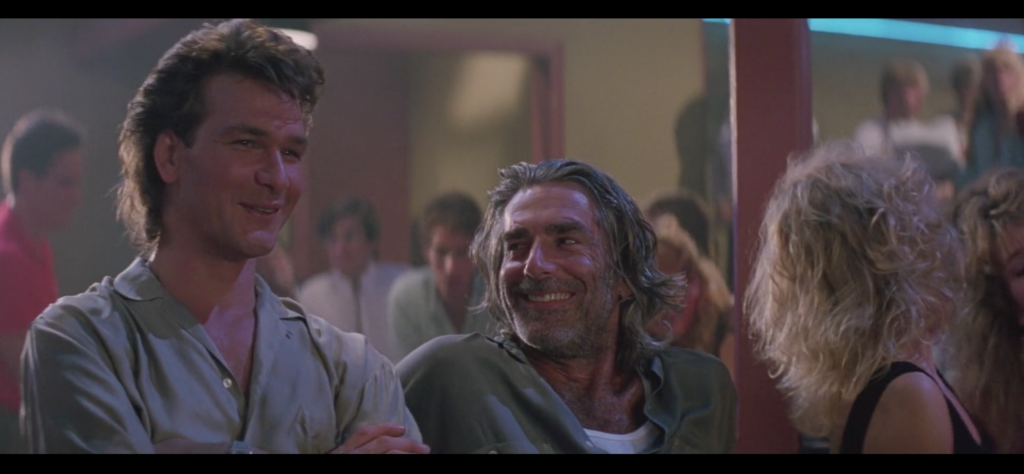 Road House is a film about a very famous bouncer. Not the most famous bouncer; that man is a supporting character. And not technically a “bouncer” either; our hero, played by Patrick Swayze, beautiful and terrible as the dawn, is a cooler, which is to say the Head Bouncer In Charge. But his job is basically bouncing, and he’s so good at it that he’s become famous for it.
Road House is a film about a very famous bouncer. Not the most famous bouncer; that man is a supporting character. And not technically a “bouncer” either; our hero, played by Patrick Swayze, beautiful and terrible as the dawn, is a cooler, which is to say the Head Bouncer In Charge. But his job is basically bouncing, and he’s so good at it that he’s become famous for it.
So that tells you something about the kind of film Road House is: It respects the people who beat up people who beat up other people in bars so much that it affords them significant renown. Other men will fly across the country and offer these men hundreds of thousands of dollars a year for their services. Barfolk, for want of a better term, whisper their names in reverent awe. In the land of the blockheaded, the two-fisted man is king.
Because their reputations precede them, or because to invoke them inaugurates the ritually contracted cycle of redemptive violence for which they’ve been hired, the bouncers of Road House are reluctant to share their names.
“You got a name?” asks Carrie Ann, waitress at the Double Deuce, the ultraviolent Missouri honky-tonk at the heart of the story. “Yeah,” answers our hero.
“What’s your name, buddy?” asks Pat, the Double Deuce’s thieving failnephew bartender, who is played by John Doe of Los Angles punk institution X. “Coffee, black,” responds our hero.
When he conducts his first official bouncing during his tenure at the Double Deuce by smashing the face of a man with a switchblade and a Hawaiian shirt through a table adjacent to the one on which this man’s girlfriend has been dancing and thus lowering the overall atmosphere of class in the establishment, it falls to our hero’s blind white blues-playing guitarist friend Jeff Healey (appearing as himself) to reveal his identity to the amazed, and in several cases visibly aroused, patrons.
“The name,” he says, “is Dalton.”
Dalton is by this point in the film known to the Double Deuce’s staff, over whom he’s been given absolute authority by the bar’s bizarre owner Frank Tilghman. “What he says? Goes,” Tilghman tells his employees.
“It’s my way or the highway,” Dalton concurs.
The first person to learn his identity other than Tilghman himself is Carrie Ann, who powers through our hero’s extremely badass rebuff as described above and gets him to name himself, the way Superman tricks his gnomish extradimensional enemy Mr. Mxyzptlk into saying his own name backwards to eliminate him. (Carrie Ann has no such goal, of course; it is perhaps for this reason that she is rewarded later in the film with a glimpse of our hero in the nude. to which she reacts with slackjawed lust so powerful, courtesy of actor Kathleen Wilhoite, that it all but glows with its own internal erotic energy.)
“Shit,” Carrie Ann says when Dalton reveals himself. “I heard a’ you!”
The news spreads like wildfire through the waitstaff, bartenders, and bouncers already in the Double Deuce’s employ, none of whom need its import explained to them. Like I said, a famous bouncer’s reputation precedes him. One man has heard he ripped a guy’s throat out with his bare hands. Another has heard he has balls big enough to come in a dump truck. “Sometimes you wanna go where everybody knows your name,” runs the song from another artifact of Eighties bar culture. Dalton can go anywhere.
Which gives us some indication of his exact level of fame. No one at the Double Deuce recognizes him on sight, which means he’s not so famous that his face alone writes his ticket for him. However, the moment he says “Dalton” in response to Carrie Ann’s query, she immediately assumes he is the Dalton famous for being a bouncer, and not any of the other myriad possible Daltons in the world—B. the bookseller, for example. It’s as if she asked a woman who was new to the Double Deuce for her name, and that woman replied “Gaga.” Only one person leaps to mind.
This separates our hero from his hero. “Wade Garrett’s the best,” Dalton tells Tilghman when the Missouri restaurateur says he’s heard he, Dalton, is the best. “Wade Garrett’s getting old,” Tilghman replies. But age has not dimmed his starpower. Arguably, age is responsible for it. The longer he’s been out there, bouncing and cooling, the more time the dive-bar demimonde has had to put a face to the name.
The face belongs to Sam Elliott, who in this film has long greasy hair, tight black jeans, five o’clock shadow that creeps up his face nearly to his eyes, and a grizzled sexuality that wafts from the screen like a musk. When he arrives at the Double Deuce to help his one-time protégé Dalton defend the establishment against the depredations of Brad Wesley, a local business tycoon and J.C. Penney franchisee played by Ben Gazzara (The Killing of a Chinese Bookie), no one asks his name, because no one needs to. Practically the entire staff stares at him with the wide eyes of children in a film directed by Chris Columbus when he limps bowleggedly into the place looking for his mijo.
Grinning slyly, his eyes twinkling with a sinister delight that seems to be actor Kevin Tighe’s natural mien and has no basis within the character itself, Tilghman looks at this man and says, “I know you.”
Wade Garrett, it can be concluded, has achieved a level of fame so total that even people steeped enough in bouncer culture to know Dalton by name know him by sight. Michael Jordan fame. Michael Jackson fame. Santa Claus fame. Wade Garrett is the best, Dalton tells us. And when Dalton speaks, we would do well listen. It’s his way or the highway. What he says? Goes.
Directed by Rowdy Herrington, written by David Lee Henry and Hilary Henkin (Academy Award winner, Wag the Dog), released in 1989, directed by Rowdy Herrington (the name bears repeating), and starring Patrick Swayze, Kelly Lynch, Sam Elliott, Ben Gazzara, and an assortment of people with anywhere between one to six lines of dialogue all of whom I adore completely, Road House is one of my favorite movies ever made. I like to talk about it. I hope you’ll like to listen.

